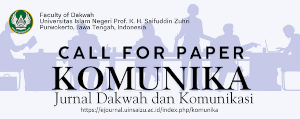PENDEKATAN FENOMENOLOGI DALAM KAJIAN AGAMA
DOI:
https://doi.org/10.24090/komunika.v7i2.385Keywords:
religion, renaisance, knowledge, fenomenology.Abstract
The scientific study of religion can be traced to the 19th century and theearly of 20th century, which was influenced by rennaissance. The objectives ofscientific religion was to give an objective description, especially to the westernpeople, of various aspects of religious life in this world. Most of the made somecomparition and demonstrated the superiority of western culture and religioncompared with those of other parts of the world.Moders scientist insist on taking their approaches and disciplines from premodernstudies which contained subjective and normative assumptions andperspectives, depended on supranatural and other authority, and ignored thestandards of accurate and objective science.In relation to the above condition, phenomenology of religion emerged asan effort to avoid etnocentrical and normative approaches.Downloads
Download data is not yet available.
Downloads
Issue
Section
Articles
License
Authors who publish with this journal agree to the following terms:
- Authors retain copyright and grant the journal right of first publication with the work simultaneously licensed under a Creative Commons Attribution-ShareAlike 4.0 International License that allows others to share the work with an acknowledgement of the work's authorship and initial publication in this journal.
- Authors are able to enter into separate, additional contractual arrangements for the non-exclusive distribution of the journal's published version of the work (e.g., post it to an institutional repository or publish it in a book), with an acknowledgement of its initial publication in this journal.
- Authors are permitted and encouraged to post their work online (e.g., in institutional repositories or on their website) prior to and during the submission process, as it can lead to productive exchanges, as well as earlier and greater citation of published work (See The Effect of Open Access).
























